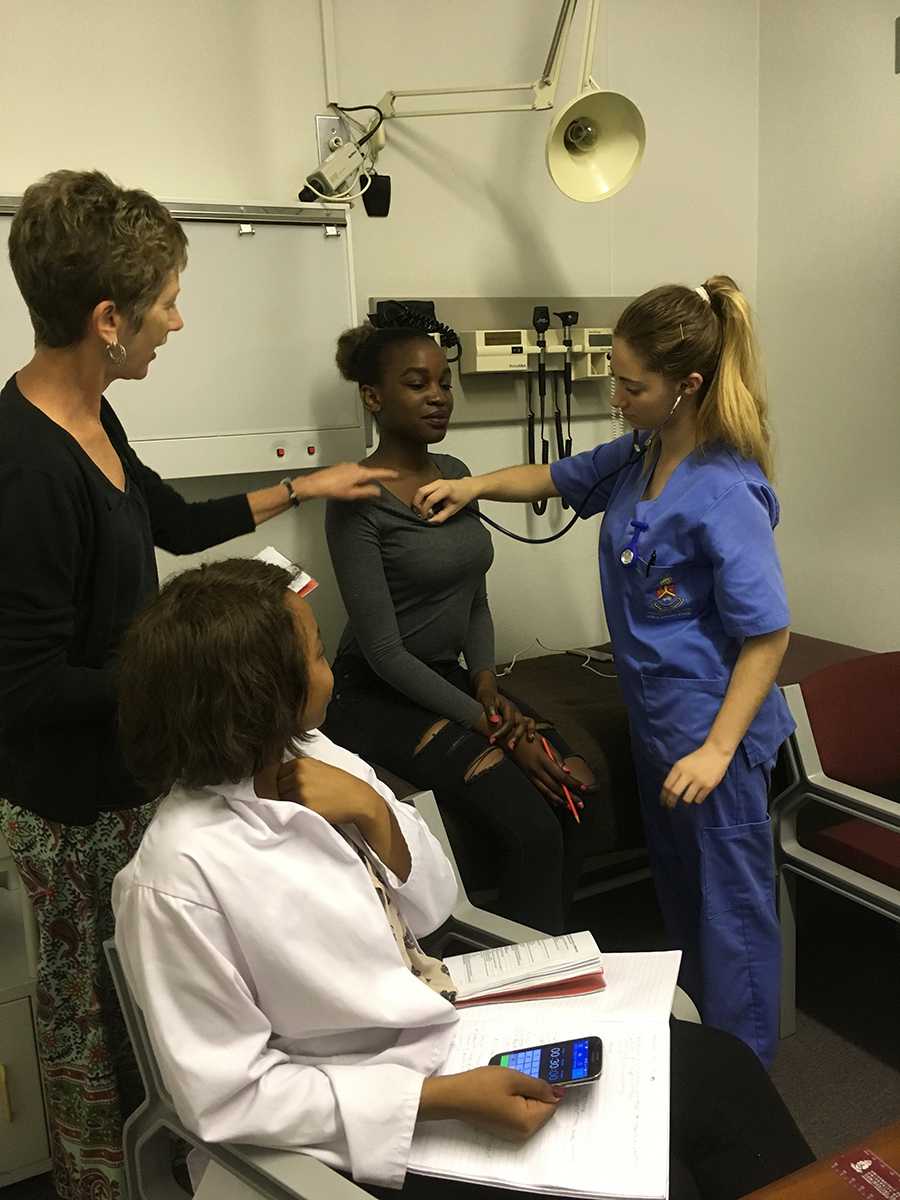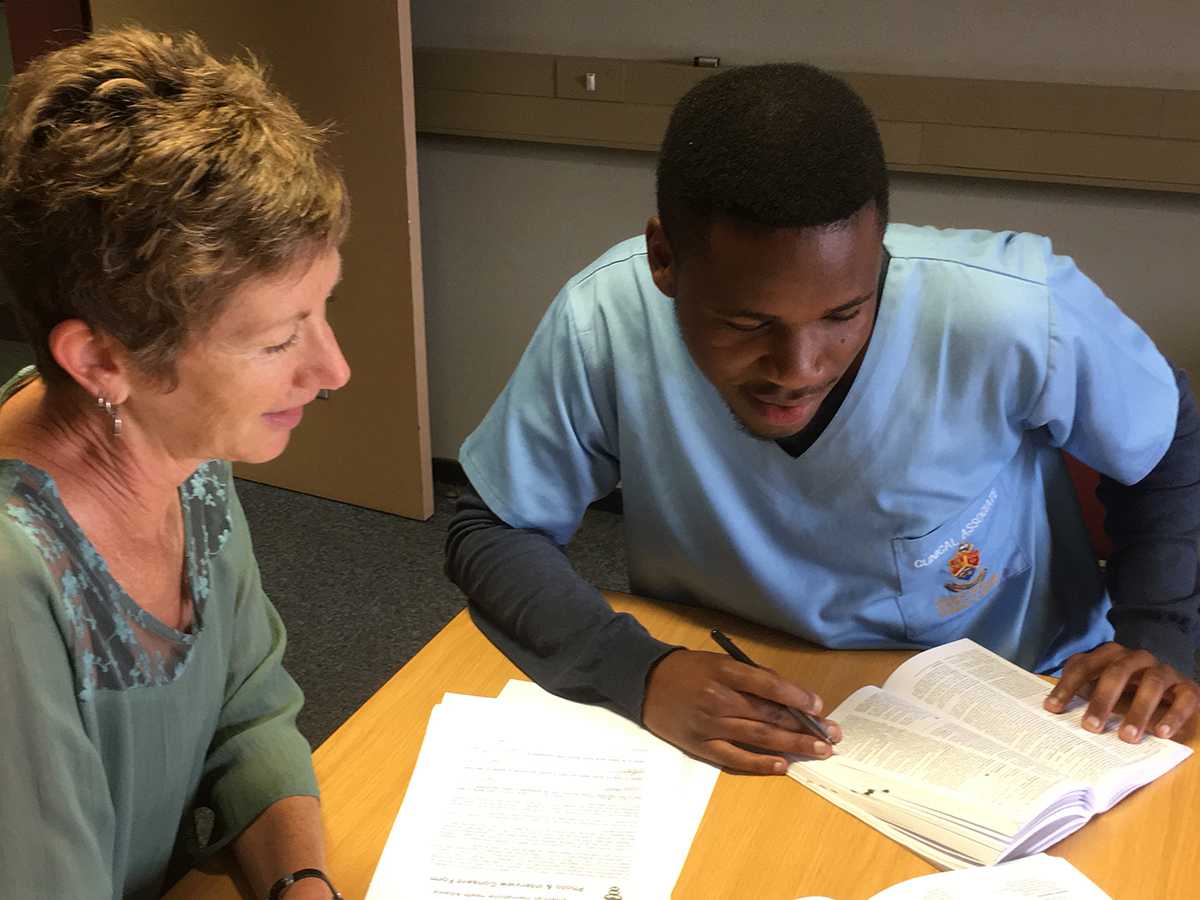Clinical Mentors Make a Real Difference in Training New Frontline Health Workers in South Africa
PEPFAR-funded twinning initiatives support skills-based learning by deploying skilled medical professionals to serve as volunteer lecturers, clinical mentors.

US Physician Assistant Julie Himstedt (standing left) mentors University of Pretoria Clinical Associate students at Mamelodi Hospital in Pretoria. As part of AIHA’s PEPFAR-supported HIV/AIDS Twinning Center Program, Himstedt is volunteering as a lecturer and clinical mentor for students training to become mid-level medical professionals in South Africa.
Like many countries in sub-Saharan Africa, South Africa is faced with a dire shortage of qualified health workers. The country is home to more than 51 million people, yet has fewer than 40,000 medical practitioners. About 75 percent of those work in the private health sector — a luxury only the wealthiest 20 percent of the population can afford. For the vast majority of South Africans, the provider-to-patient ratio is just 2.0 per 10,000 people.
One solution to bridging South Africa’s health worker gap has been to train and deploy new mid-level medical cadres, including Clinical Associates. This cadre can complete training in three years, which means they can begin providing quality care to people in need much sooner. They are also more likely to remain in South Africa’s public health workforce than doctors, who often move to private practice or even leave the country for higher paying positions abroad.
With support from the US President’s Emergency Plan for AIDS Relief (PEPFAR) and the US Centers for Disease Control and Prevention (CDC) in South Africa, the American International Health Alliance (AIHA) is providing technical assistance to the three South African universities currently training Clinical Associates: Walter Sisulu University, University of the Witwatersrand, and University of Pretoria through twinning partnerships that link these institutions with counterpart universities in the United States.
To further support these critical training programs and facilitate hands-on practical training in community-based clinics and hospitals, AIHA recruits highly skilled professionals for long-term placements as lecturers and mentors. The experienced Physician Assistants share their knowledge and expertise with students, providing a wealth of information and advice — as well as an international perspective — that greatly enhances their training.
Colorado Physician Assistant Julie Himstedt is currently mentoring Phuti Moloto, a second-year Clinical Associate student at the University of Pretoria.
“As my mentor this semester, Ms. Himstedt has really helped me with my thought process in terms of approaching patient case studies and analyzing investigative studies. Even though the process to my perfection in these areas is still ongoing, I can confidently say under her mentorship, a lot has changed,” he says.

US Physician Assistant Julie Himstedt works with University of Pretoria Clinical Associate student Phuti Moloto, providing advice and support to help develop his research and analytical skills.
With the final two years of the three-year, competency-based Clinical Associates curriculum focused on learning through actual practice at clinical sites, having a dedicated mentor to answer questions; model effective, patient-centered care; and provide bedside training in diagnostic and clinical procedures is invaluable.
As Mr. Moloto notes, this sort of one-on-one mentoring and support is also crucial for instilling the strong research and analytical skills that make Clinical Associates important members of multidisciplinary teams that are providing healthcare services, including HIV/AIDS treatment, care, and support, to people in rural and underserved communities across South Africa.
For Ms. Himstedt, AIHA’s Volunteer Healthcare Corps Clinical Associate Mentors Program was a way for her to transfer her experience as an HIV/AIDS case manager for the Colorado Aids Project, a Physician Assistant working in family medicine and urgent care, and an adjunct faculty/facilitator for the Problem Based Learning course at Red Rocks Community College’s Physician Assistant Program to an international setting.
“I’ve been practicing as a Physician Assistant for the past seven years in a setting that serves all socioeconomic backgrounds. During that time, I have been a clinical preceptor for seven PA students and three Nurse Practitioner students for clinical rotations. I’ve also had numerous first-year PA students shadow me for a day,” she explains, noting that she derives tremendous satisfaction in teaching students and sharing her clinical practice experiences.
“When I learned of the Clinical Associate Mentor Program, I knew it was exactly the opportunity I was looking for to provide service and participate in the clinical education process,” Ms. Himstedt said of her year-long placement, which will conclude in July 2017.
- Page last reviewed: February 16, 2017
- Page last updated: February 16, 2017
- Content source:
Global Health
Notice: Linking to a non-federal site does not constitute an endorsement by HHS, CDC or any of its employees of the sponsors or the information and products presented on the site.


 ShareCompartir
ShareCompartir